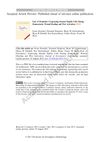 November 2023 in “Frontiers in veterinary science”
November 2023 in “Frontiers in veterinary science” The study provides insights into hair growth mechanisms in yaks.
 December 2020 in “Daehanhanuihakoeji”
December 2020 in “Daehanhanuihakoeji” Rumex japonicas Houttuyn ethanol extract helps increase hair growth and protect against hair damage.
 3 citations,
November 2018 in “Curēus”
3 citations,
November 2018 in “Curēus” The cause and importance of misplaced oil glands in the hair follicle are not well understood.
 August 2023 in “Scientific reports”
August 2023 in “Scientific reports” Human stem cells were turned into cells similar to those that help grow hair and showed potential for hair follicle formation.
 39 citations,
March 2018 in “Archives of Dermatological Research”
39 citations,
March 2018 in “Archives of Dermatological Research” Androgens may block hair growth signals, targeting this could treat hair loss.
 November 2023 in “Food science of animal resources”
November 2023 in “Food science of animal resources” Lactilactobacillus curvatus LB-P9 taken orally helps hair regrow faster and thicker in mice.

Bone Morphogenetic Proteins (BMPs) are important for hair growth, and their decrease due to hormones could lead to hair loss, but adding more BMPs could promote hair growth.
 28 citations,
May 2019 in “Life Sciences”
28 citations,
May 2019 in “Life Sciences” Ginsenoside Rb1 from Panax ginseng helps mink hair grow by activating certain cell signals.
 14 citations,
February 2021 in “International Journal of Pharmaceutics”
14 citations,
February 2021 in “International Journal of Pharmaceutics” Deer antler velvet serum helps hair grow and is safe for skin.
 1 citations,
June 2023 in “Animals”
1 citations,
June 2023 in “Animals” CRABP2 helps increase the growth of cells important for hair growth by activating a specific growth pathway.
 115 citations,
December 2017 in “Wiley Interdisciplinary Reviews-Developmental Biology”
115 citations,
December 2017 in “Wiley Interdisciplinary Reviews-Developmental Biology” Skin cells called dermal fibroblasts are important for skin growth, hair growth, and wound healing.
 September 2017 in “Journal of Investigative Dermatology”
September 2017 in “Journal of Investigative Dermatology” Aging causes sweat glands to shrink, leading to skin issues, and blue light can help hair grow.
4 citations,
June 2020 in “Cosmetics” Broussonetia papyrifera extract helps hair growth by regulating specific proteins.
 16 citations,
February 2019 in “Gene”
16 citations,
February 2019 in “Gene” Researchers found a good way to isolate hair follicle stem cells from newborn goats for further study.
 32 citations,
August 2015 in “Journal of Investigative Dermatology”
32 citations,
August 2015 in “Journal of Investigative Dermatology” Prominin-1 expressing cells in the dermal papilla help regulate hair follicle size and communication but don't aid in skin repair.
 61 citations,
September 2010 in “Genomics”
61 citations,
September 2010 in “Genomics” The study found that immune responses disrupt hair growth cycles, causing hair loss in alopecia areata.
 March 2023 in “Scientific reports”
March 2023 in “Scientific reports” Hair growth-related cells need the enzyme SCD1 to help maintain the area that supports hair growth.
Natural products may help treat hair loss by promoting hair growth with fewer side effects.
 September 2024 in “Genes”
September 2024 in “Genes” CRABP1 boosts hair cell growth in Hu sheep by affecting key genes.
 171 citations,
July 2007 in “Journal of Investigative Dermatology”
171 citations,
July 2007 in “Journal of Investigative Dermatology” A substance called DKK-1 increases in balding areas and causes hair cells to die when exposed to DHT.
 August 2024 in “Current Issues in Molecular Biology”
August 2024 in “Current Issues in Molecular Biology” Key genes and RNAs related to hair growth in sheep were identified, aiding future breeding improvements.
 170 citations,
July 2012 in “Journal of Investigative Dermatology”
170 citations,
July 2012 in “Journal of Investigative Dermatology” Wnt ligands are crucial for hair growth and repair.
 41 citations,
June 2006 in “Journal of Investigative Dermatology”
41 citations,
June 2006 in “Journal of Investigative Dermatology” Beard and scalp hair cells have different gene expressions, which may affect beard growth characteristics.
6 citations,
February 2010 in “Biotechnology and bioprocess engineering” Using umbilical cord stem cells can help create hair-growing tissues more affordably.
 7 citations,
July 2019 in “International Journal of Molecular Sciences”
7 citations,
July 2019 in “International Journal of Molecular Sciences” PGA-4HGF may help treat hair loss by activating hair growth pathways and extending the hair growth phase.
 April 2023 in “Advanced functional materials”
April 2023 in “Advanced functional materials” The study created a tool that mimics natural cell signals, which increased cell growth and could help with hair regeneration research.
 7 citations,
August 2020 in “Animal biotechnology”
7 citations,
August 2020 in “Animal biotechnology” A specific RNA in cashmere goats helps improve hair growth by interacting with certain molecules.
 7 citations,
January 2020 in “International Journal of Molecular Sciences”
7 citations,
January 2020 in “International Journal of Molecular Sciences” Low-frequency electromagnetic fields can boost molecules related to hair growth in human skin cells.
 10 citations,
May 2019 in “BMC Complementary and Alternative Medicine”
10 citations,
May 2019 in “BMC Complementary and Alternative Medicine” The extract from Bacillus/Trapa japonica fruit helps increase hair growth and could be a potential treatment for hair loss.
 3 citations,
January 2019 in “Advances in stem cells and their niches”
3 citations,
January 2019 in “Advances in stem cells and their niches” Dermal papilla cells are key for hair growth and color, influencing hair type and size, and their interaction with stem cells could help treat hair loss and color disorders.



























